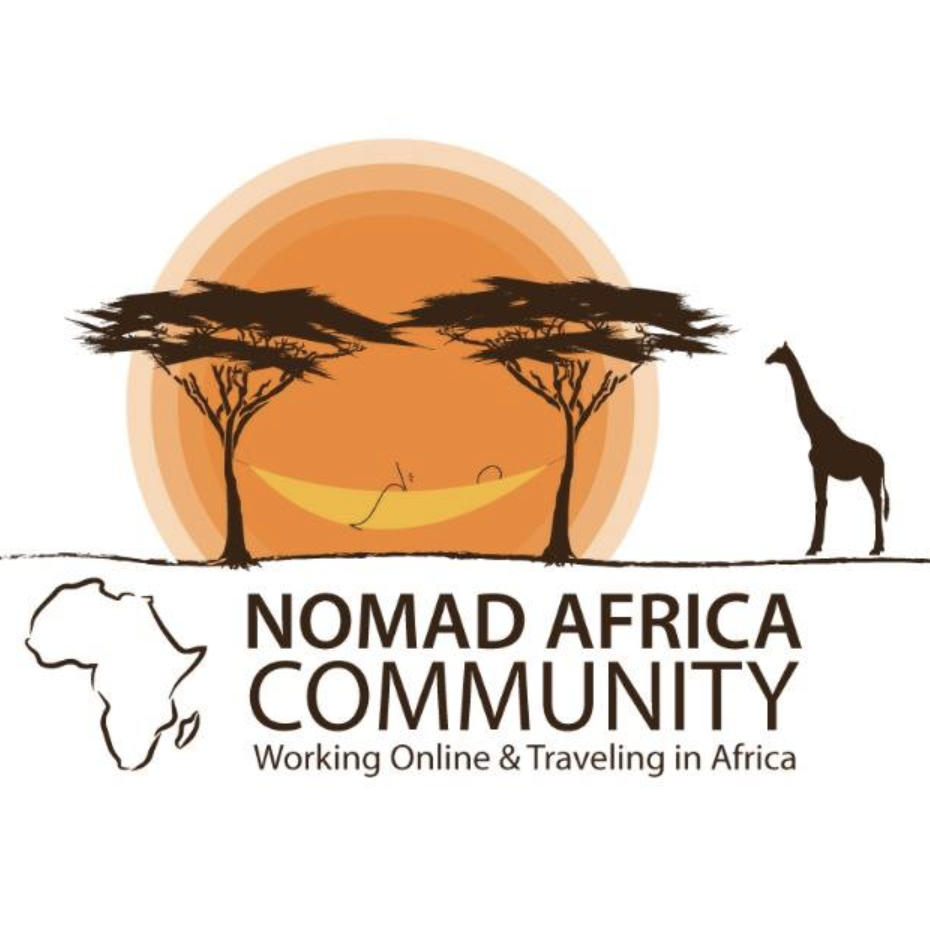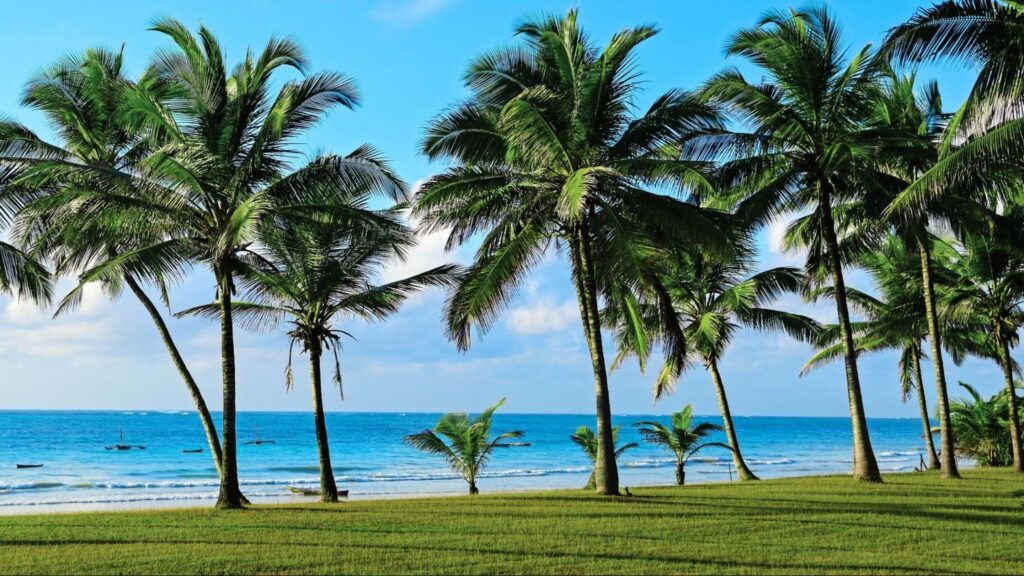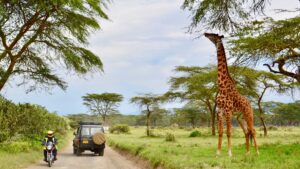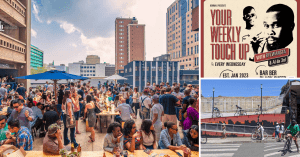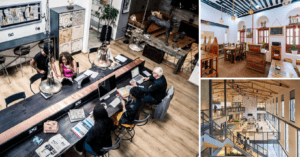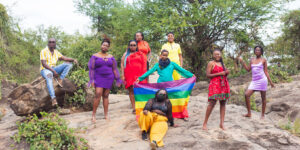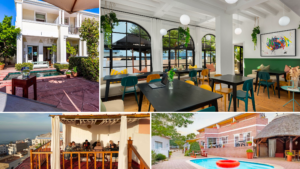Mozambique is a beautiful country in southern Africa with a lot to offer digital nomads. From its stunning beaches to its rich culture, Mozambique has something for everyone.
Digital nomads will find that Mozambique is a great place to work remotely. The internet is reliable, and there are a number of coworking and coliving spaces available. The cost of living is also relatively low, making Mozambique a budget-friendly option.
In addition to its beautiful beaches, Mozambique is also home to a number of other attractions, including the Bazaruto Archipelago, the Gorongosa National Park, and the ruins of the Great Zimbabwe. Whether you’re interested in relaxing on the beach, exploring the rainforest, or learning about Mozambique’s rich history, you’re sure to find something to love as a digital nomad in Mozambique.
Jump To:
Things to Do in Mozambique | Destinations | Internet | Co-Working Spaces | Coliving Spaces | Best Times to Visit | Visas | Cost of Living | How to Get There | Culture and Lifestyle | Safety and Security | Frequently Asked Questions
| Main Languages | Portuguese, English, Swahili |
| Capital city | Maputo |
| Main airport(s) | Maputo International Airport (Maputo), Beira International Airport and Nampula International Airport. |
| Currency | Mozambican Metical (MZN) |
| Time Zone | Central Africa Time (CAT, GMT+2) |
| Plug Socket Type | Type C and F |
| Best time(s) to Visit | April to November |
| Internet Quality | Good |
| Highlights | Stunning Beaches; Wildlife Safaris; Gorongosa National Park |
Things to Do in Mozambique
Mozambique is a beautiful country with a rich history and culture. It offers a variety of attractions and things to do for digital nomads. Here are some of the top attractions to explore during your stay:
Beaches
Mozambique is known for its stunning beaches, and there are plenty to choose from. Some of the most popular beaches include:
- Tofo Beach: This beach is famous for its clear waters and is a great spot for surfing and diving.
- Pemba Beach: This beach is located in the north of Mozambique and is known for its crystal-clear waters and white sand.
- Ponta do Ouro: This beach is located in the south of Mozambique and is known for its beautiful coral reefs and marine life.
Culture and History
Mozambique has a rich cultural and historical heritage, and there are many places to explore. Some of the top cultural and historical attractions include:
- The Island of Mozambique: This island is a UNESCO World Heritage Site and is home to many historical landmarks, including the Fort of São Sebastião and the Chapel of Nossa Senhora de Baluarte.
- The National Art Museum: This museum is located in Maputo and showcases a variety of traditional Mozambican art.
- The Maputo Central Market: This market is a great place to experience the local culture and pick up some souvenirs.
Art and Music
Mozambique has a vibrant art and music scene, and there are many opportunities to experience it. Some of the top attractions include:
- The Gil Vicente Theatre: This theatre is located in Maputo and is a great place to catch a show or concert.
- The Nucleo de Arte: This art center is located in Maputo and showcases a variety of contemporary Mozambican art.
Festivals
Mozambique is home to a variety of festivals throughout the year. Some of the top festivals include:
- The Maputo International Music Festival: This festival takes place in November and features a variety of local and international musicians.
- The Mozambique International Film Festival: This festival takes place in Maputo and showcases a variety of films from around the world.
Overall, Mozambique has a lot to offer digital nomads in terms of attractions and things to do. Whether you’re looking to explore the country’s rich history and culture or simply relax on the beach, there is something for everyone.
Best Destinations for Digital Nomads
Mozambique is a beautiful country in Africa that offers a unique experience for digital nomads. With its stunning beaches, rich culture, and affordable cost of living, Mozambique is a great destination for remote workers. However, if you are looking for other options, there are several other countries that you might want to consider.
Portugal
Portugal is a popular destination for digital nomads due to its mild climate, beautiful scenery, and vibrant culture. The country has a thriving startup scene and is home to several co-working spaces, making it easy for remote workers to connect with like-minded individuals. Lisbon, the capital city, is particularly popular among digital nomads due to its affordable cost of living and excellent quality of life.
Ireland
Ireland is another great option for digital nomads. The country has a highly educated workforce, a strong economy, and a vibrant culture. Dublin, the capital city, is home to several co-working spaces, making it easy for remote workers to connect with other professionals. The country also has a high quality of life, a low crime rate, and a beautiful natural landscape.
Sydney
Sydney is a bustling city in Australia that offers a unique experience for digital nomads. The city has a thriving startup scene, a high quality of life, and a vibrant culture. There are several co-working spaces in Sydney, making it easy for remote workers to connect with other professionals. The city is also home to several beautiful beaches, parks, and landmarks.
Colombia
Colombia is a beautiful country in South America that offers a unique experience for digital nomads. The country has a rich culture, a low cost of living, and a warm climate. Medellin, the second-largest city in Colombia, is particularly popular among digital nomads due to its affordable cost of living, excellent quality of life, and thriving startup scene.
Costa Rica
Costa Rica is a popular destination for digital nomads due to its beautiful natural landscape, warm climate, and affordable cost of living. The country has a thriving startup scene and is home to several co-working spaces, making it easy for remote workers to connect with other professionals. The country also has a high quality of life, a low crime rate, and a strong economy.
Overall, there are several great destinations and places to live for digital nomads. Whether you are looking for a warm climate, a low cost of living, or a vibrant culture, there is a destination that will suit your needs. Mozambique is a great option for those looking for a unique experience, but there are several other countries that you might want to consider.
Internet Connectivity
As a digital nomad in Mozambique, internet connectivity is an essential factor to consider. While Mozambique has made significant strides in improving its internet infrastructure, the quality and reliability of the internet can still vary depending on the location.
WiFi Availability
WiFi is widely available in Mozambique, especially in urban areas like Maputo, Beira, and Nampula. Most hotels, cafes, and coworking spaces offer free WiFi to their customers. However, the quality of WiFi can be inconsistent, and speeds can be slow, especially during peak hours. It is essential to have a backup plan, such as a mobile hotspot or a local SIM card, in case the WiFi connection is unreliable.
Internet Speed
The internet speed in Mozambique is generally slow compared to other countries, with an average download speed of around 5 Mbps. However, some areas have faster internet speeds than others, and it is possible to find locations with speeds of up to 20 Mbps. It is essential to research the internet speed in the area you plan to stay and consider it before choosing accommodation or a coworking space.
Internet Reliability
Internet reliability can be a challenge in Mozambique, especially in rural areas, where the infrastructure is less developed. Power outages are common, and the internet can go down during these outages. It is essential to have a backup plan, such as a mobile hotspot or a local SIM card, to ensure that you can continue working even during power outages.
In conclusion, while Mozambique has made significant strides in improving its internet infrastructure, the quality and reliability of the internet can still vary depending on the location. It is essential to research the availability, speed, and reliability of the internet in the area you plan to stay and consider it before choosing accommodation or a coworking space.
Coworking Spaces
Mozambique is a great place for digital nomads who are looking for coworking spaces. The country has a growing number of coworking spaces that offer affordable and flexible options for remote workers.
Here are some of the best coworking spaces in Mozambique:
-
Hub Maputo: Located in the heart of Maputo, Hub Maputo is a popular coworking space among digital nomads. It offers a variety of workspace options, including private offices, hot desks, and meeting rooms. The space is equipped with high-speed internet, printing facilities, and a kitchenette. Hub Maputo also hosts regular events and workshops for its members.
-
Ideario Coworking: Ideario Coworking is a modern and spacious coworking space in Maputo. It offers flexible membership plans, including daily, weekly, and monthly options. The space features high-speed internet, a coffee bar, and a rooftop terrace with stunning views of the city. Ideario Coworking also has a community of like-minded professionals who collaborate and network with each other.
-
Coworking Vilankulo: Coworking Vilankulo is a coworking space located in the coastal town of Vilankulo. It offers a relaxed and inspiring work environment, with views of the ocean and access to a swimming pool. The space is equipped with high-speed internet, printing facilities, and a kitchenette. Coworking Vilankulo also organizes social events and excursions for its members.
-
Casa do Sol Coworking: Casa do Sol Coworking is a coworking space located in the city of Beira. It offers a range of workspace options, including private offices, hot desks, and meeting rooms. The space is equipped with high-speed internet, printing facilities, and a kitchenette. Casa do Sol Coworking also has a community of entrepreneurs and creatives who share ideas and collaborate with each other.
Overall, Mozambique has a variety of coworking spaces that cater to the needs of digital nomads. Whether you’re looking for a quiet place to work or a vibrant community of professionals, you’re sure to find a coworking space that suits your needs.
Coliving Spaces
Coliving spaces are a popular option for digital nomads who want to live and work with like-minded individuals while traveling. Mozambique has a few coliving spaces that provide comfortable accommodation and workspaces for digital nomads.
Selina
Selina is a global coliving and coworking chain that has a location in Maputo, Mozambique. The coliving space has private rooms, dorms, and suites that are designed with a bohemian feel. Selina also has a coworking space that provides high-speed internet, comfortable workstations, and meeting rooms. The coliving space has a communal kitchen, a restaurant, and a bar that serves healthy food and drinks.
Outsite
Outsite is a coliving and coworking space that has a location in Tofo, Mozambique. The coliving space has private rooms, suites, and apartments that are designed with a modern feel. Outsite also has a coworking space that provides high-speed internet, comfortable workstations, and meeting rooms. The coliving space has a communal kitchen, a restaurant, and a bar that serves healthy food and drinks.
CoWorksurf
CoWorksurf is a coliving and coworking space that has a location in Tofo, Mozambique. The coliving space has private rooms, suites, and apartments that are designed with a beachy feel. CoWorksurf also has a coworking space that provides high-speed internet, comfortable workstations, and meeting rooms. The coliving space has a communal kitchen, a restaurant, and a bar that serves healthy food and drinks.
Zoku
Zoku is a coliving space that has a location in Amsterdam, Netherlands, and Cape Town, South Africa. The coliving space has private lofts that are designed with a modern feel. Zoku has a communal kitchen, a restaurant, and a bar that serves healthy food and drinks. The coliving space has a coworking space that provides high-speed internet, comfortable workstations, and meeting rooms.
Overall, coliving spaces are a great option for digital nomads who want to live and work with like-minded individuals while traveling. Mozambique has a few coliving spaces that provide comfortable accommodation and workspaces for digital nomads. Selina, Outsite, CoWorksurf, and Zoku are some of the popular coliving spaces in Mozambique.
Best Times to Visit
Mozambique is a beautiful country with a tropical climate, making it a great destination for digital nomads looking for a warm and sunny place to work from. The best time to visit Mozambique is between April and November, during the dry season. During this time, the weather is warm and sunny, with little to no rain, making it perfect for exploring the country’s beaches, national parks, and other attractions.
Weather
The dry season in Mozambique is characterized by warm and sunny weather, with temperatures ranging from 25°C to 30°C. The humidity is relatively low, making it more comfortable for outdoor activities. The coastal resorts can be visited throughout the year, but December, January, and February tend to be very wet, which might spoil a beach holiday. Diving and snorkeling are best from April to June and September to November.
Pandemic
As of June 2023, Mozambique is open for tourism, but travelers must adhere to certain COVID-19 protocols, such as presenting a negative PCR test taken within 72 hours of arrival, wearing masks in public places, and practicing social distancing. The situation may change, so it’s important to check the latest travel advisories before planning a trip.
Worst Times to Visit
The worst time to visit Mozambique is during the rainy season, which runs from December to March. During this time, the country experiences heavy rainfall and high humidity, which can make it uncomfortable for outdoor activities. The roads can also become impassable, making it difficult to travel around the country. Additionally, the risk of malaria is higher during the rainy season, so travelers are advised to take precautions such as using mosquito nets and wearing insect repellent.
Tourist and Digital Nomad Visas
Mozambique offers both tourist and digital nomad visas for foreign visitors. Here’s what you need to know about each type of visa:
Tourist Visa
Tourists can enter Mozambique with a tourist visa, which is valid for up to 90 days. To apply for a tourist visa, you need to provide:
- A valid passport with at least six months of validity left
- A completed visa application form
- Two passport-sized photos
- Proof of hotel reservations or an invitation letter from a resident of Mozambique
- A return ticket or proof of onward travel
- Proof of sufficient funds to cover your stay
You can apply for a tourist visa at the Mozambican embassy or consulate in your home country or at the port of entry in Mozambique. The visa processing can take up to 10 business days, and the immigration officer will stamp your passport upon arrival.
Digital Nomad Visa
Mozambique also offers a digital nomad visa for remote workers who want to stay in the country for up to 180 days. To apply for a digital nomad visa, you need to provide:
- A valid passport with at least six months of validity left
- A completed visa application form
- Two passport-sized photos
- Proof of medical insurance
- Proof of sufficient funds to cover your stay
- Bank statements for the last three months
- Proof of hotel reservations or an invitation letter from a resident of Mozambique
- Travel details, including your itinerary and return ticket
You can apply for a digital nomad visa at the Mozambican embassy or consulate in your home country. The visa processing can take up to 10 business days, and you will receive an approval letter via email. Upon arrival in Mozambique, you will need to present the approval letter to the immigration officer, who will stamp your passport.
Note that the digital nomad visa requires you to have a remote job or business that generates income outside of Mozambique and to be proficient in the English language. It is also recommended to have a local contact in Mozambique who can assist you with the visa application process and provide support during your stay.
In summary, Mozambique offers both tourist and digital nomad visas for foreign visitors. Make sure to check the visa requirements and application process beforehand, and prepare all the necessary documents, including a valid passport, proof of sufficient funds, and travel details. With the right preparation, you can enjoy your stay in Mozambique as a tourist or a digital nomad.
Cost of Living
Mozambique is one of the most affordable countries in Africa, making it a popular destination for digital nomads. The cost of living in Mozambique is lower than in most Western countries, and the average monthly cost of living for a digital nomad is around $2,457.
Housing is the biggest expense for digital nomads in Mozambique. A one-bedroom apartment in the city center costs around $500 per month, while a similar apartment outside the city center costs around $350 per month. If you’re looking for a cheaper option, shared accommodation can cost as little as $150 per month.
Food in Mozambique is relatively cheap, and you can eat well for around $5 per meal. Local markets and street vendors offer fresh produce at very reasonable prices. A liter of milk costs around $1, while a loaf of bread costs around $0.50.
Transportation is also affordable in Mozambique. A one-way ticket on public transport costs around $0.50, while a taxi ride within the city center costs around $5. If you plan to travel around the country, renting a car can cost around $20 per day.
It’s important to note that the Mozambican Metical (MZN) is the official currency of Mozambique, and it’s recommended that digital nomads exchange their currency upon arrival. Many establishments in Mozambique only accept cash, so it’s important to carry enough cash with you at all times.
Overall, Mozambique offers a low cost of living, making it an attractive destination for digital nomads looking to save money while working remotely.
How to Get There
Mozambique is located in southeastern Africa and is bordered by Tanzania to the north, Malawi, and Zambia to the northwest, Zimbabwe to the west, Swaziland, and South Africa to the southwest, and the Indian Ocean to the east. Getting to Mozambique is relatively easy, with several options available.
By Air
The easiest way to get to Mozambique is by air, with several international airlines flying into the country’s major airports. The main airport is Maputo International Airport, which is located in the capital city of Maputo. Other international airports in Mozambique include Beira International Airport and Nampula International Airport.
Alternatively, you can fly to South Africa and then take a connecting flight to Mozambique. South Africa has several international airports, including O.R. Tambo International Airport in Johannesburg and Cape Town International Airport.
By Land
If you are in South Africa, you can drive to Mozambique. The most popular border crossing is the Lebombo/Ressano Garcia border post, which connects South Africa’s Mpumalanga Province to Mozambique’s Maputo Province. You can also take a bus from Johannesburg to Maputo, which takes around 8 hours.
By Sea
If you are coming from Tanzania, you can take a ferry from Dar es Salaam to Pemba Island or Zanzibar Island and then take a connecting flight to Mozambique. There are also several cruise ships that visit Mozambique’s coastal cities, including Maputo and Beira.
In summary, getting to Mozambique is easy, with several options available. The easiest way to get there is by air, with several international airlines flying into the country’s major airports. Alternatively, you can drive from South Africa or take a ferry from Tanzania.
Culture and Lifestyle
Mozambique is a country with a rich cultural heritage that has been influenced by its history of Bantu, Swahili, and Portuguese rule. The majority of its inhabitants are black Africans, and its main language is Portuguese. Mozambique’s culture has expanded since its independence in 1975, and it has a rich history in the areas of arts, cuisine, and music.
Culture and History
Mozambique’s culture and history is a blend of African, Arab, and European influences. The Portuguese ruled Mozambique for over four centuries, and their influence can be seen in the country’s architecture, language, and cuisine. Mozambique’s culture is also heavily influenced by its Bantu and Swahili roots.
Cuisine
Mozambique’s cuisine is a blend of African, Portuguese, and Indian influences. The country is known for its seafood, and its national dish is matapa, a stew made from cassava leaves, peanuts, and coconut milk. Piri piri, a spicy sauce made from chili peppers, is a popular condiment in Mozambique.
Art and Music
Mozambique has a rich artistic and musical heritage. The country is known for its traditional dance and music, which is heavily influenced by African and Portuguese rhythms. The timbila, a traditional xylophone, is a popular instrument in Mozambique.
Festivals
Mozambique has a number of festivals throughout the year. The Maputo International Music Festival is a popular event that attracts musicians from around the world. The Marrabenta Festival, held in the city of Inhambane, celebrates Mozambique’s traditional music and dance.
Overall, Mozambique’s culture and lifestyle is a blend of African, Portuguese, and Indian influences. The country has a rich history and heritage that is reflected in its cuisine, music, and festivals.
Safety and Security
As a digital nomad in Mozambique, it’s important to be aware of the safety and security risks in the country. Here are some tips to help you stay safe:
General Safety
- Avoid walking alone at night, especially in isolated areas.
- Keep your valuables out of sight and avoid displaying wealth.
- Be cautious when using ATMs and avoid using them at night.
- Always carry identification with you.
Transportation Safety
- Only use licensed taxis and avoid getting into unmarked vehicles.
- If you’re renting a car, make sure it’s in good condition and has working seat belts.
- Be cautious when using public transportation, especially at night.
Health and Medical Safety
- Mozambique has a high prevalence of HIV/AIDS, so it’s important to practice safe sex.
- Malaria is also a risk in Mozambique, so make sure to take appropriate preventative measures such as using mosquito nets and taking anti-malaria medication.
- If you require medical attention, be aware that medical facilities in Mozambique may not be up to the standards you’re used to.
Political and Social Unrest
- Protests and demonstrations can occur with little notice, so it’s important to remain vigilant and avoid them.
- Stay up to date with the latest news and be aware of any political or social tensions in the country.
By staying aware of these risks and taking appropriate precautions, you can enjoy your time as a digital nomad in Mozambique while staying safe and secure.
Frequently Asked Questions
What are some affordable cities to live in as a digital nomad in Mozambique?
Mozambique has several affordable cities that are great for digital nomads, including Maputo, Beira, and Nampula. Maputo is the capital city and has a vibrant culture, while Beira is known for its beautiful beaches. Nampula is a quieter city and is perfect for those who prefer a more peaceful environment.
What are the best co-working spaces in Mozambique for digital nomads?
There are several co-working spaces in Mozambique that are great for digital nomads, including Impact Hub Maputo, The Base, and Beira Business Center. These co-working spaces offer high-speed internet, comfortable workspaces, and a community of like-minded individuals.
Are there any digital nomad communities in Mozambique?
Yes, there are several digital nomad communities in Mozambique, including NomadSphere and Digital Nomads Mozambique. These communities offer a platform for digital nomads to connect, network, and share experiences.
What are the visa requirements for digital nomads in Mozambique?
Digital nomads can enter Mozambique on a tourist visa, which is valid for up to 90 days. However, if you plan to stay longer, you will need to apply for a work visa. It is recommended to consult with the Mozambican embassy or consulate in your home country for the most up-to-date visa requirements.
What is the internet connectivity like in Mozambique for digital nomads?
The internet connectivity in Mozambique is improving, but it is still not as reliable as in other countries. Large cities like Maputo have better internet connectivity, but in more remote areas, you may experience slower speeds or connectivity issues.
Can you recommend any local resources for digital nomads in Mozambique?
NomadSphere and Digital Nomads Mozambique are great resources for digital nomads in Mozambique. Additionally, the Mozambique Digital Nomads Facebook group is a good platform to connect with other digital nomads and get advice on living and working in Mozambique.
